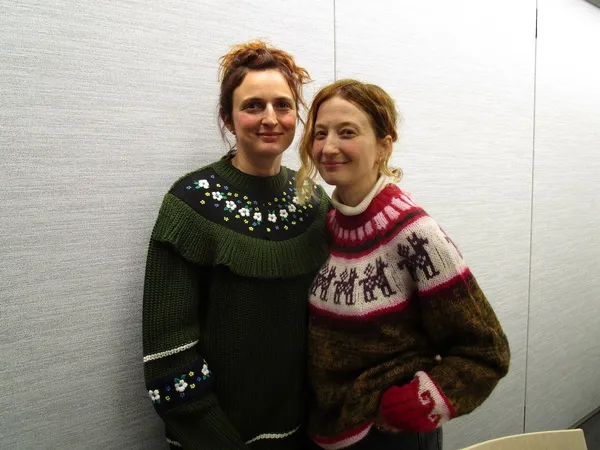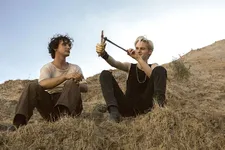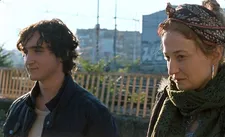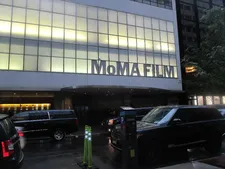 |
| Alice Rohrwacher with Alba Rohrwacher at the Museum of Modern Art in New York for The Wonders: Alice and Alba Rohrwacher Photo: Anne-Katrin Titze |
Before the start of The Wonders: Alice and Alba Rohrwacher, organised by Museum of Modern Art Department of Film Curator Josh Siegel with Camilla Cormanni and Paola Ruggiero of Luce Cinecittà, Alice Rohrwacher, the director/screenwriter of the 2018 Cannes Best Screenplay winner Happy As Lazzaro (shared with Jafar Panahi and Nader Saeivar for Three Faces), met with me inside MoMA’s Cullman building, while the first snow of the season fell on the streets of Manhattan. Just as in her 2014 Cannes Grand Prix winner, The Wonders (Le Meravigile), her sister Alba Rohrwacher is a strong presence in Lazzaro. Alice’s first feature Corpo Celeste (Heavenly Body) had also been selected for the 2011 Cannes Film Festival.
 |
| Lazzaro (Adriano Tardiolo) with Tancredi (Luca Chikovani) |
Happy As Lazzaro (Lazzaro Felice), shot by Hélène Louvart, executive produced by Martin Scorsese, stars Adriano Tardiolo with Alba Rohrwacher, Luca Chikovani, Agnese Graziani, Nicoletta Braschi, Sergi López, and Tommaso Ragno. Ginevra Elkann’s If Only (Magari), starring Alba with Brett Gelman, Riccardo Scamarcio, and Céline Sallette will screen earlier in the afternoon on December 4 before the opening night selection of The Wonders: Alice and Alba Rohrwacher.
Anne-Katrin Titze: First of all congratulations for this series at MoMA. That's terrific.
Alice Rohrwacher: It's incredible.
AKT: Incredible and very well deserved. The title The Wonders for your work so far makes perfect sense.
AR: Thank you. In fact, I have to say that when they asked us to do a retrospective we had to look back at what we did and it's really an incredible story. If we imagine all our life and to be here now, it's even more incredible than incredible. If we think of our parents and how we grew up and the adventurous life we had, it's very very beautiful. It's a big honour.
 |
| Adriano Tardiolo as Lazzaro with Alba Rohrwacher as Antonia |
AKT: Something I absolutely love about Lazzaro is what you do with time. Because you meld at least three different types of time. Linear time, cyclical time through nature, and magical time that is completely out of this world and from a different realm. Could you talk about this braiding of times?
AR: It's very difficult to explain all the work we did because there is in fact a cyclical time from the past. Then there is political time, because the people think they are living in another time. Also there is an imagination of time. What the Marchesa [Nicoletta Braschi] says about time. So there is the natural time, the time of the Marchesa - what she imposes.
AKT: Onto them, as sharecroppers.
AR: Yes. And then there is a travel through time. So the imagination of time. I think what to do with it is to look at every time as a memory. Even the time of the present when Lazzaro [Adriano Tardiolo] arrives in the city, even the city is not really present. It's a memory of the present. Does that make sense to you?
 |
| Alice Rohrwacher on Happy As Lazzaro (Lazzaro Felice): “There is the natural time, the time of the Marchesa … And then there is a travel through time.” |
AKT: Totally makes sense.
AR: It's very strange. We tried to create a world that is specific but at the same time is always and everywhere. It's very specific. They talk in a dialect, it's very attached to a county but at the same moment can be everywhere. Because we use the magic power of memory. Even when we have to choose clothes or a place to shoot, we decide to choose places that bring us to a memory. I say "us" because I work with a crew.
AKT: And your sister Alba just told me how much she is involved from the start. In a scene in the city, there is a basket with nettles and wild carrots, "all growing for free." This basket on a small scale is already what you are talking about. Grounded in the earth and the stars above.
AR: Yes.
AKT: I saw the film a year ago in October and when I looked at my notes, they read a bit like haikus. My notes on other films don't sound like this. I'll read some to you: "Women are drying tobacco leaves. Sheep going out. A storm is coming." And another line of notes: "Lazzaro stands. Stares in the rain, next to ducks. He has a fever." There is a poetic quality even in blind notes in the cinema. Any thoughts on the haikus you are creating?
 |
| Alice Rohrwacher’s Happy As Lazzaro is executive produced by Martin Scorsese |
AR: I'm very happy to know about it. Yes. It's very beautiful.
AKT: There is a strong connection to nature. And you made them grow tobacco - of all things.
AR: I wanted it to be more free. In fact I think I cannot impose a story to people. I think the story of the movie is something that has to emerge from a world. It's very strange, because we have an imagination, we've read something, and then we pretend that this thing happened. But there are different ways to make it happen. One is to impose it and another one is ...
AKT: … to grow it.
AR: Grow it and make a ritual. And ask the favour to the story to happen. I think this is a little bit magic. Every time I made a movie, the biggest effort is to build a world. And this world has to be real, even in the imagination. So, for example, in Lazzaro we really planted a tobacco field and we put in all the animals and we asked everyone to go back to live as in the past. Because then for them everything was more natural to make a scene where they have to act.
There are 54 non-actors in the movie. To help them, it's like a net that acrobats use to protect them when they have to jump from one place to another. There is a net. And I think all the work that is done to build a world, it's this net that helps you to make very dangerous things.
 |
| The Wonders: Alice and Alba Rohrwacher at the Museum of Modern Art in New York Photo: Anne-Katrin Titze |
AKT: You are doing very dangerous things as far as narrative is concerned.
AR: Yeah.
The Wonders: Alice and Alba Rohrwacher screenings with introductions:
If Only: Wednesday, December 4 at 4:00pm (introduced by Ginevra Elkann and Alba Rohrwacher) - Titus Theater 2.
Happy As Lazzaro: Wednesday, December 4 at 7:00pm (introduced by Alice and Alba Rohrwacher) - Titus Theater 1.
Corpo Celeste: Thursday, December 5 at 6:30pm (introduced by Alice Rohrwacher) - Titus Theater 2.
Alice Rohrwacher: Four Short Films - Un Piccolo Spettacolo (A Little Show) directed with Pier Paolo Giarolo; 9 × 10 novanta: “Una Canzone” (9 × 10 Ninety: “A Song”); La Traviata (“Violettina”), and De Djess: Friday, December 6 at 4:00pm (introduced by Alice Rohrwacher) - Titus Theater 2.
The Wonders: Friday, December 6 at 7:00pm (introduced by Alice Rohrwacher) - Theater Titus 2.
Coming up - Alba Rohrwacher on directors she has worked with and more from Alice Rohrwacher.
The Wonders: Alice and Alba Rohrwacher retrospective runs from December 4 through December 23 at the Museum of Modern Art Debra and Leon Black Family Film Center.





















